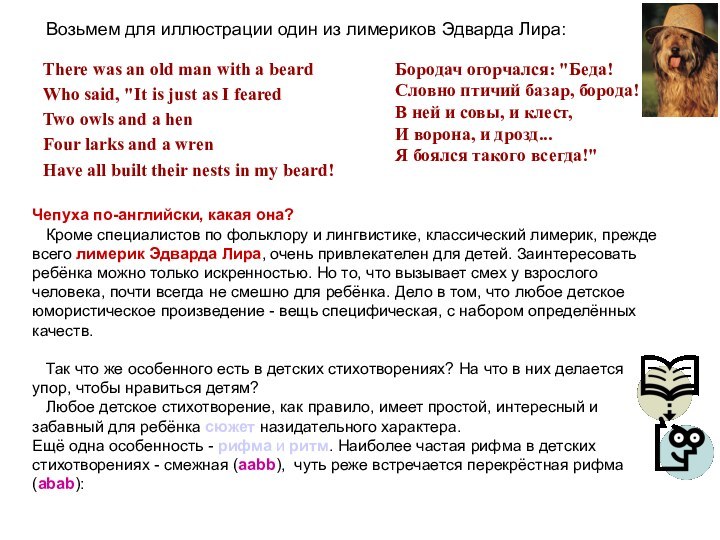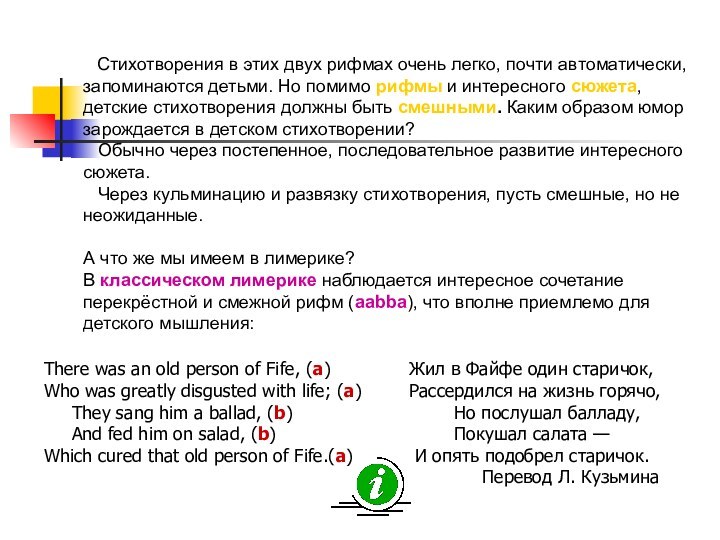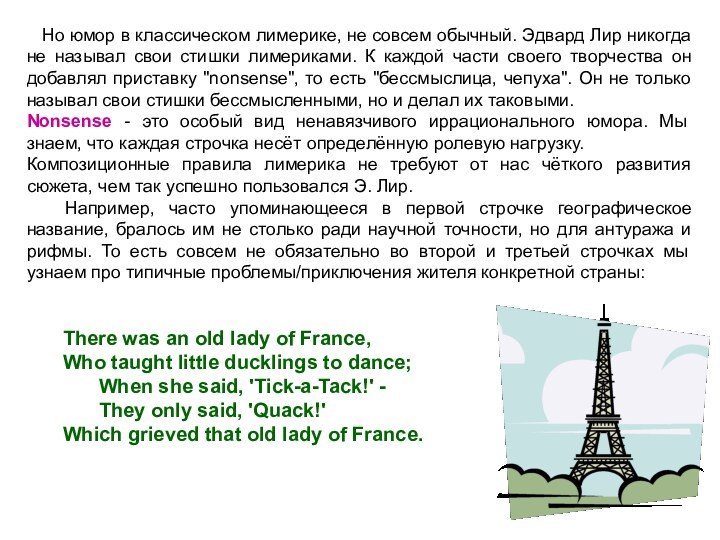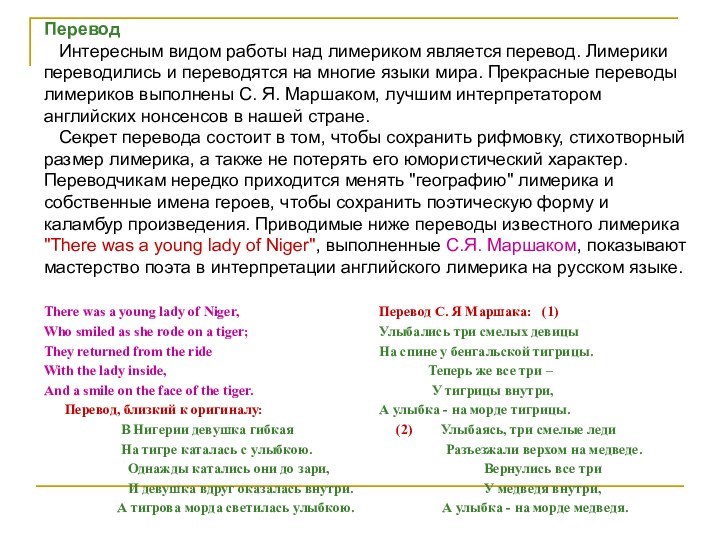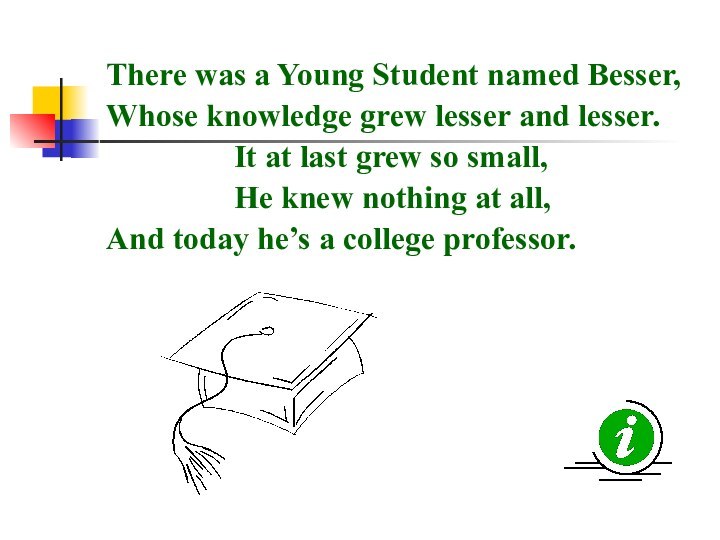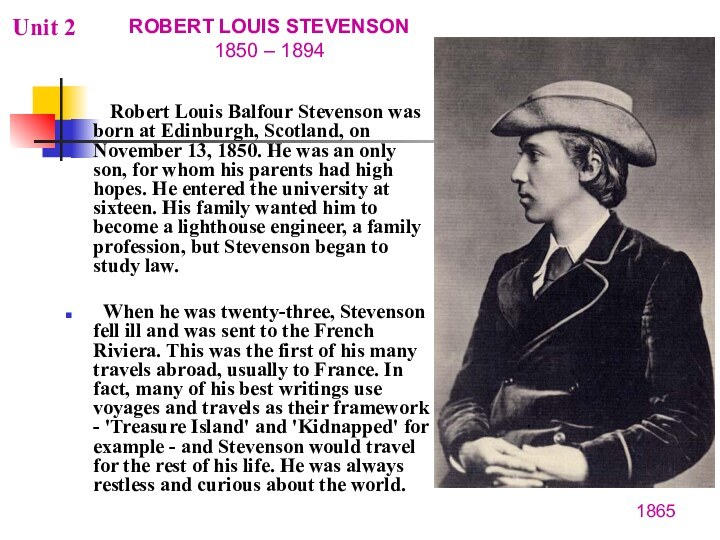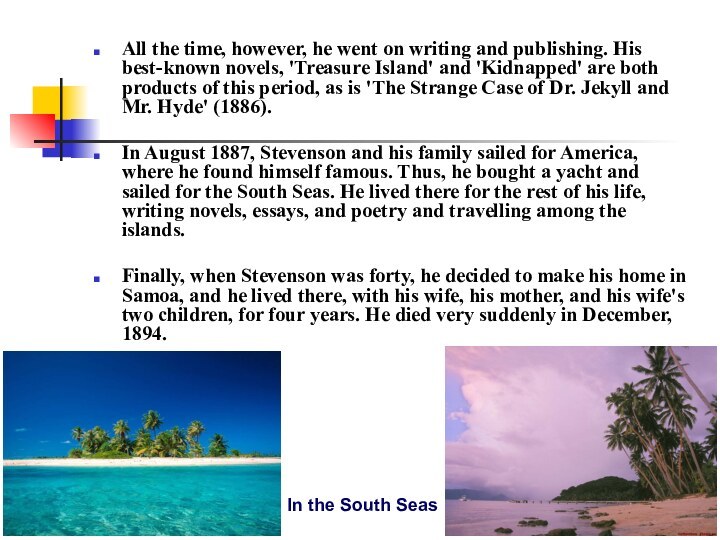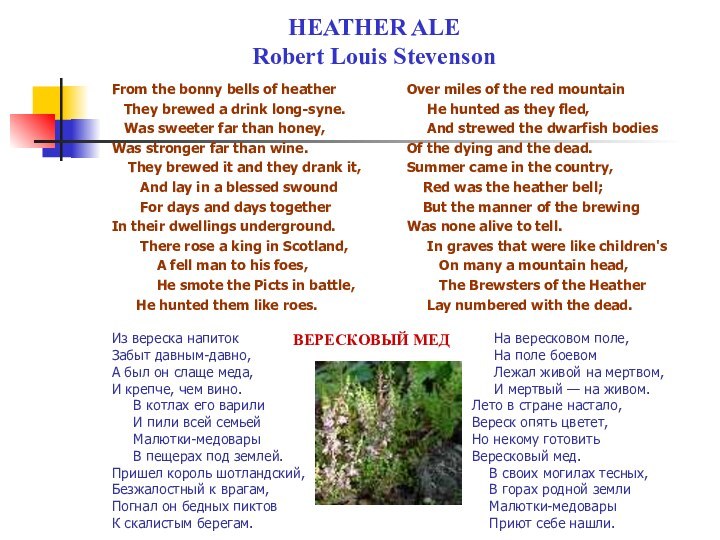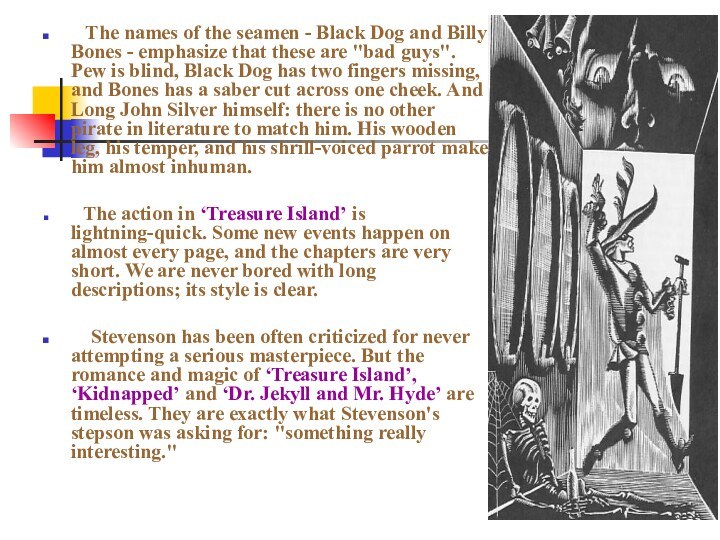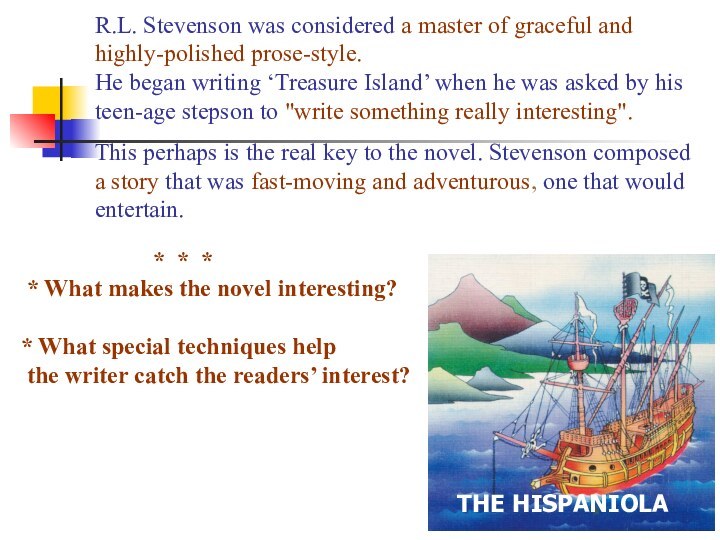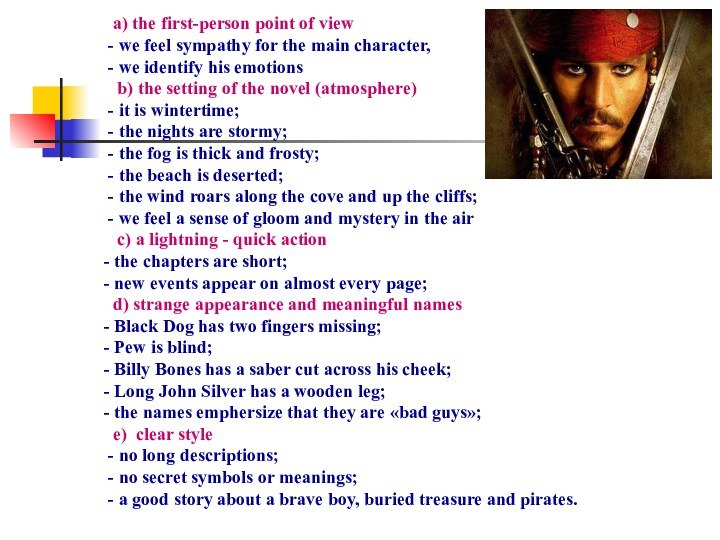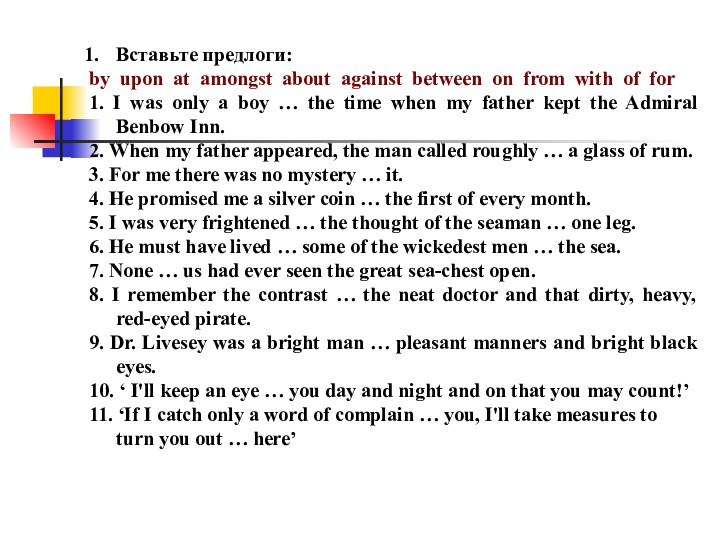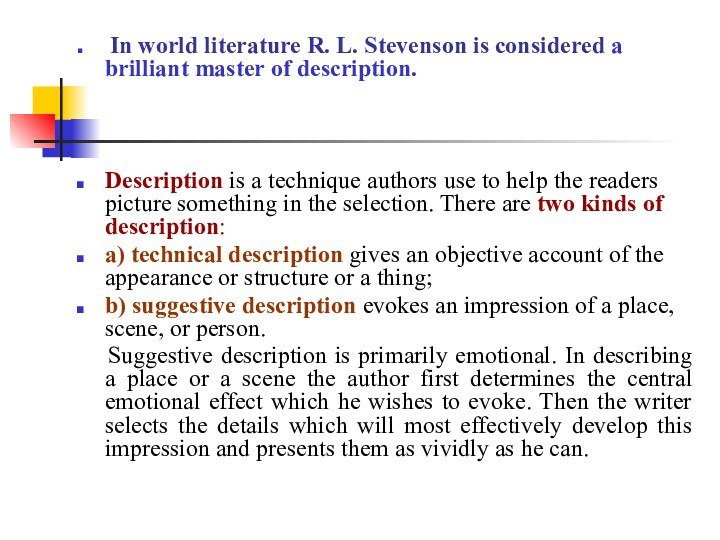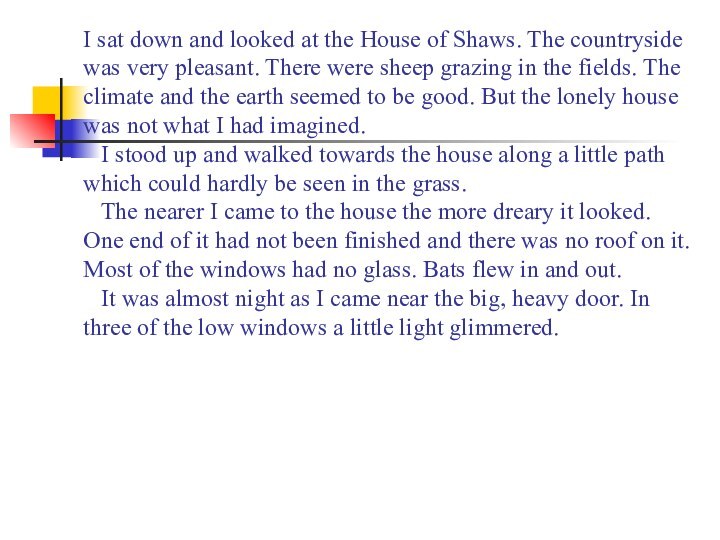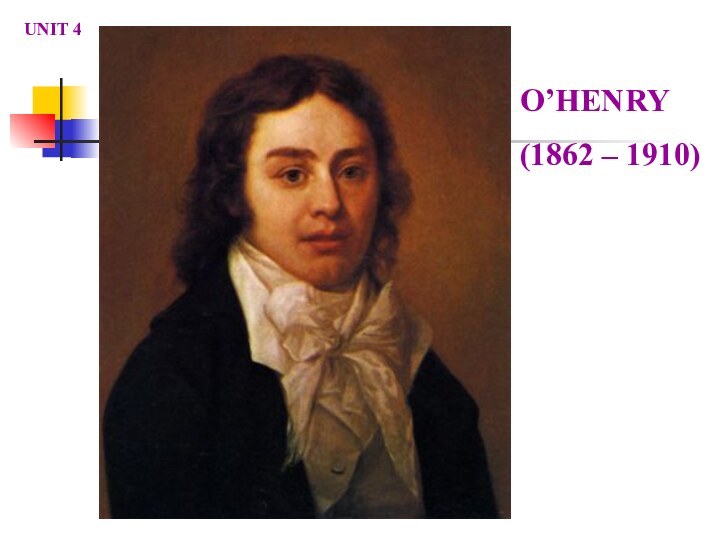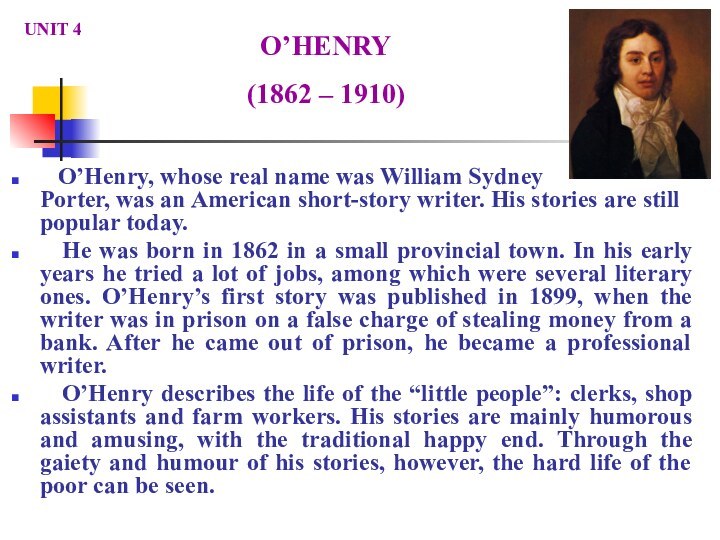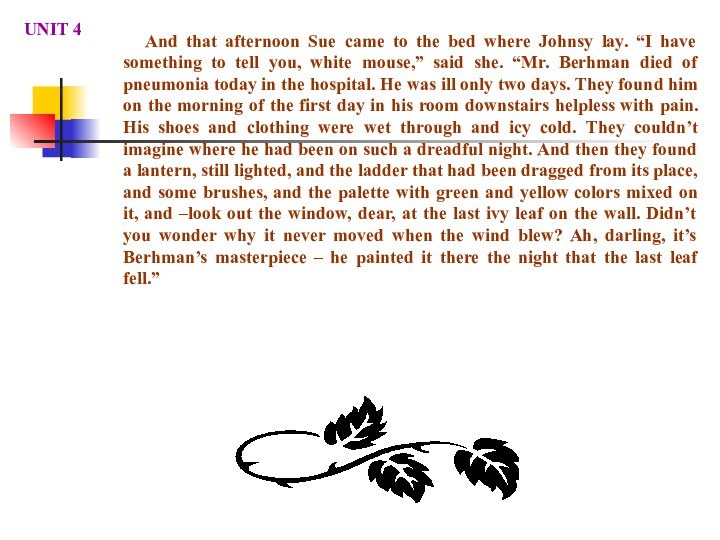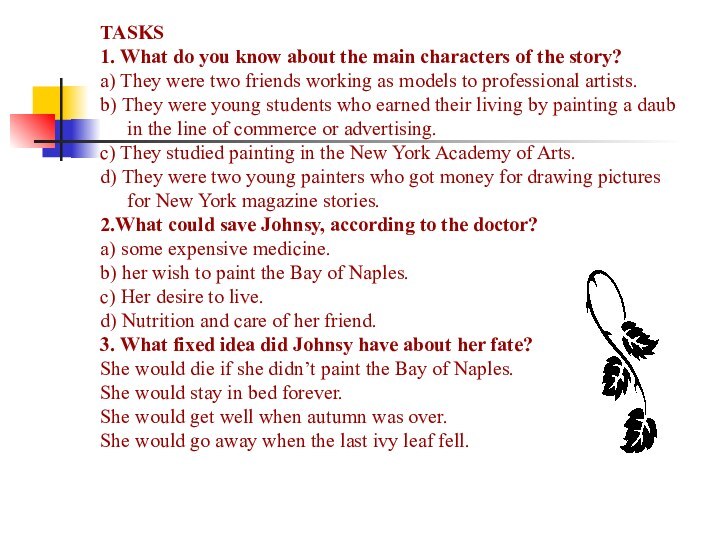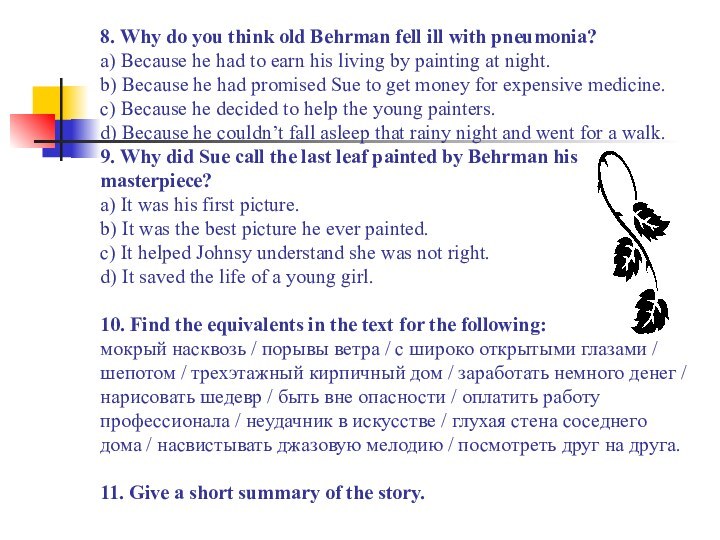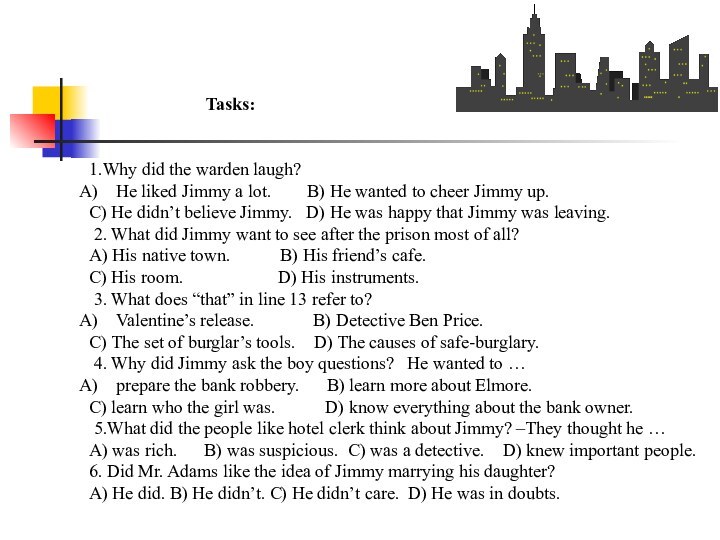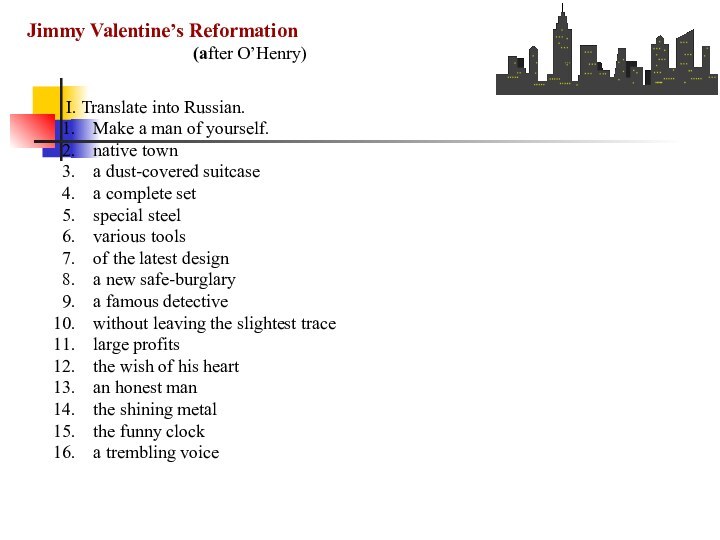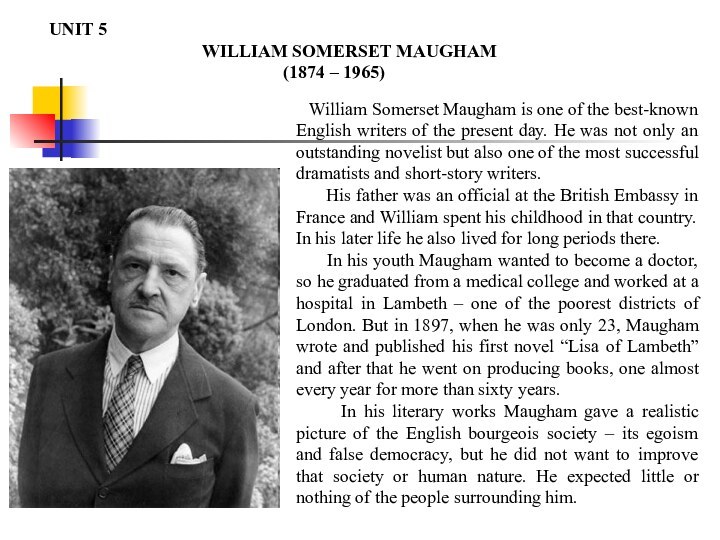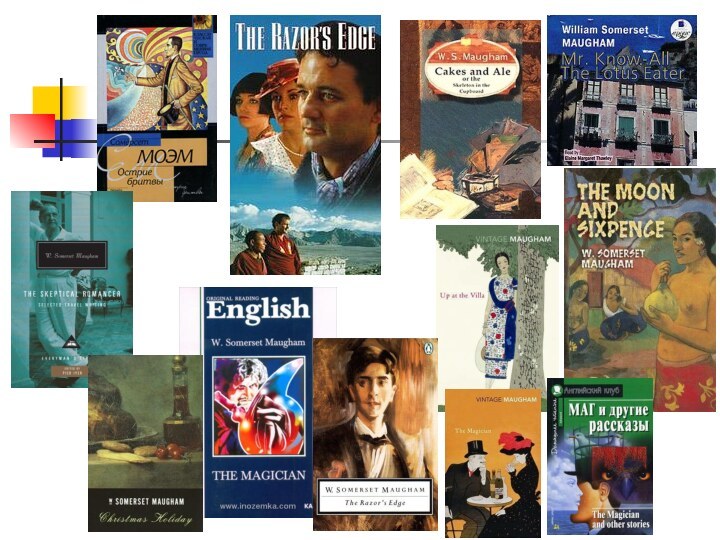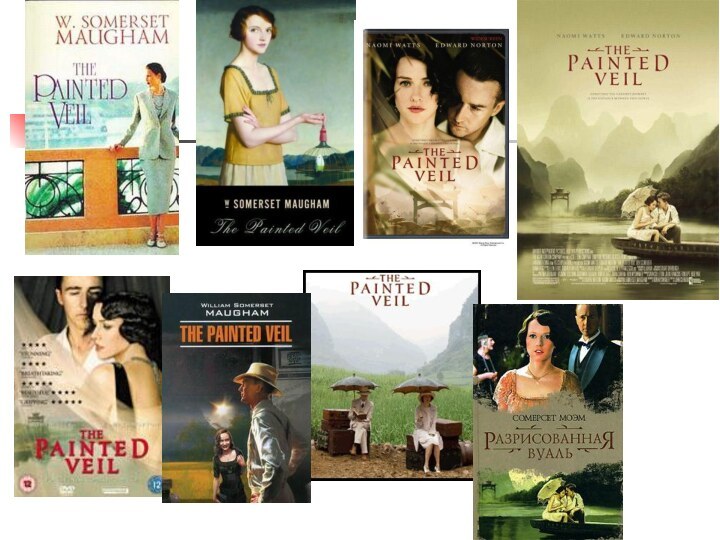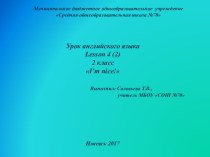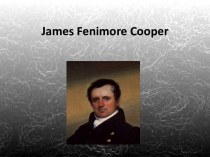Слайд 2
LIMERICKS
limerick ['lim(e)rik] n
- лимерик (шуточное стихотворение из
пяти строк, где две первые рифмуются с последней;
-
по названию города Лимерик в Ирландии;
название стихотворения восходит к обычаю придумывать и петь на вечеринках шуточные песенки, припевом которых была фраза "Will you come up to Limerick?" –
" Вы приедете в Лимерик?")
limerick ['lim(e)rik] n
a form of comic verse consisting of five lines of which the first, second, and fifth have three metrical feet and rhyme together and the third and fourth have two metrical feet and rhyme together
Unit 1
Слайд 3
Лимерики являются непременной частью языковой культуры для

англоговорящих народов мира. "Отцом лимерика" называют известного английского поэта,
короля английской поэзии нонсенса (nonsense verse) Эдварда Лира (Edward Lear, 1812 - 1888).
В сущности Лир был по профессии художником, лишь впоследствии он стал поэтом. Сам Лир не называл свои шуточные стихотворения "лимериками". Слово “limerick” впервые появилось в печатном виде в 1892 году, уже после смерти поэта.
Ли́мерик - форма короткого юмористического стихотворения, построенного на обыгрывании бессмыслицы. Традиционно лимерик имеет пять строчек, построенных по схеме AABBA, причем конец последней строки повторяет конец первой. Стихотворная и ритмическая форма лимерика основана на четком чередовании сильных и слабых ударений в строке. Лимерик состоит из 5 строк и имеет своеобразный стихотворный метр, образуемый 3-х сложными стопами с сильным выделением на третьем слоге строки в 1, 2 и 5 (последней) строках, 2-х сложными стопами с сильным выделением на втором слоге в 3 и 4 строках.
Сюжетно лимерик строится примерно так: в первой строке говорится, кто и откуда, во второй - что сделал, а далее - что из этого вышло. Герои лимериков — большие чудаки и чудачки.
Слайд 4
Чепуха по-английски, какая она?
Кроме специалистов по фольклору и лингвистике, классический лимерик, прежде всего лимерик Эдварда Лира, очень привлекателен для детей. Заинтересовать ребёнка можно только искренностью. Но то, что вызывает смех у взрослого человека, почти всегда не смешно для ребёнка. Дело в том, что любое детское юмористическое произведение - вещь специфическая, с набором определённых качеств.
Так что же особенного есть в детских стихотворениях? На что в них делается упор, чтобы нравиться детям?
Любое детское стихотворение, как правило, имеет простой, интересный и забавный для ребёнка сюжет назидательного характера.
Ещё одна особенность - рифма и ритм. Наиболее частая рифма в детских стихотворениях - смежная (aabb), чуть реже встречается перекрёстная рифма (abab):
Возьмем для иллюстрации один из лимериков Эдварда Лира:
Слайд 5
Стихотворения в этих двух рифмах очень
легко, почти автоматически, запоминаются детьми. Но помимо рифмы и
интересного сюжета, детские стихотворения должны быть смешными. Каким образом юмор зарождается в детском стихотворении?
Обычно через постепенное, последовательное развитие интересного сюжета.
Через кульминацию и развязку стихотворения, пусть смешные, но не неожиданные.
А что же мы имеем в лимерике?
В классическом лимерике наблюдается интересное сочетание перекрёстной и смежной рифм (aabba), что вполне приемлемо для детского мышления:
Слайд 6
Но юмор в классическом лимерике, не
совсем обычный. Эдвард Лир никогда не называл свои стишки
лимериками. К каждой части своего творчества он добавлял приставку "nonsense", то есть "бессмыслица, чепуха". Он не только называл свои стишки бессмысленными, но и делал их таковыми.
Nonsense - это особый вид ненавязчивого иррационального юмора. Мы знаем, что каждая строчка несёт определённую ролевую нагрузку.
Композиционные правила лимерика не требуют от нас чёткого развития сюжета, чем так успешно пользовался Э. Лир.
Например, часто упоминающееся в первой строчке географическое название, бралось им не столько ради научной точности, но для антуража и рифмы. То есть совсем не обязательно во второй и третьей строчках мы узнаем про типичные проблемы/приключения жителя конкретной страны:
There was an old lady of France,
Who taught little ducklings to dance;
When she said, 'Tick-a-Tack!' -
They only said, 'Quack!'
Which grieved that old lady of France.
Слайд 7
* * *
Так или иначе, с конца

XIX века лимерики становятся широко известны повсеместно. Эдвард Лир
использовал форму народного лимерика в своей поэзии нонсенса, сделав лимерик еще более популярным. Лир является автором 212 лимериков.
Лимерики сочиняли многие известные писатели и поэты (Lewis Carroll, Rudyard Kipiling, John Galsworthy, Mark Twain). Многие лимерики написаны неизвестно кем и когда, установить их авторство уже практически невозможно.
Излюбленный прием авторов лимериков - использование неологизмов.
Неологизмы и словоупотребления Эдварда Лира прочно вошли в английскую литературу и язык. Форма лимерика, возникшая около 150 лет тому назад и возрожденная к новой жизни Э. Лиром, получила дальнейшее развитие в наши дни.
Новые лимерики продолжают лучшие традиции Лира. Диапазон "прицела" эксцентричного юмора лимериков беспределен - от политики и новейших научных открытий до сцен из жизни простого обывателя. Лимерики пишутся для людей всех возрастов и сочиняются людьми всех возрастов и профессий.
Слайд 8
Перевод
Интересным видом работы над лимериком является
перевод. Лимерики переводились и переводятся на многие языки мира.
Прекрасные переводы лимериков выполнены С. Я. Маршаком, лучшим интерпретатором английских нонсенсов в нашей стране.
Секрет перевода состоит в том, чтобы сохранить рифмовку, стихотворный размер лимерика, а также не потерять его юмористический характер. Переводчикам нередко приходится менять "географию" лимерика и собственные имена героев, чтобы сохранить поэтическую форму и каламбур произведения. Приводимые ниже переводы известного лимерика "There was a young lady of Niger", выполненные С.Я. Маршаком, показывают мастерство поэта в интерпретации английского лимерика на русском языке.
Слайд 9
Приведенные переводы С. Я. Маршака отличаются
степенью свободы интерпретации. Но оба они строго сохраняют рифмовку
английского лимерика. Вариант, выполненный неизвестным переводчиком, не обладает таким совершенством формы, хотя и
правильно передает юмористический смысл лимерика.
There was a Young Lady of Ryde,
Whose shoe-strings were seldom untied.
She purchased some clogs,
And some small spotted dogs,
And frequently walked about Ryde.
Дама с берега Волги-реки,
Завязать не сумела шнурки;
Бросив в Волгу ботинки,
Закупила на рынке Пять собак, а на ноги - коньки.
Слайд 10
There was a young lady of Niger,
Who
smiled as she rode on a tiger;
They returned from the ride
With the lady inside,
And a smile on the face of the tiger.
* * *
Одна хохотушка – девица
Любила кататься на львице.
Признаться вам честно –
Девица исчезла,
Зато улыбается львица.
Слайд 11
There was an Old May of Peru,
Who dreamt
he was eating his shoe.
He awoke in the night
In a terrible fright
And found it was perfectly true!
* * *
Однажды увидел чудак
Во сне, что он ест свой башмак.
Он вмиг пробудился
И убедился,
Что это действительно так.
Слайд 12
There was a Young Student named Besser,
Whose knowledge
grew lesser and lesser.
It at last grew so small,
He knew nothing at all,
And today he’s a college professor.
Слайд 15
Robert Louis Balfour
Stevenson was born at Edinburgh, Scotland, on November 13,
1850. He was an only son, for whom his parents had high hopes. He entered the university at sixteen. His family wanted him to become a lighthouse engineer, a family profession, but Stevenson began to study law.
When he was twenty-three, Stevenson fell ill and was sent to the French Riviera. This was the first of his many travels abroad, usually to France. In fact, many of his best writings use voyages and travels as their framework - 'Treasure Island' and 'Kidnapped' for example - and Stevenson would travel for the rest of his life. He was always restless and curious about the world.
1865
ROBERT LOUIS STEVENSON
1850 – 1894
Unit 2
Слайд 16
All the time, however, he went on writing
and publishing. His best-known novels, 'Treasure Island' and 'Kidnapped'
are both products of this period, as is 'The Strange Case of Dr. Jekyll and Mr. Hyde' (1886).
In August 1887, Stevenson and his family sailed for America, where he found himself famous. Thus, he bought a yacht and sailed for the South Seas. He lived there for the rest of his life, writing novels, essays, and poetry and travelling among the islands.
Finally, when Stevenson was forty, he decided to make his home in Samoa, and he lived there, with his wife, his mother, and his wife's two children, for four years. He died very suddenly in December, 1894.
In the South Seas
Слайд 17
Finally, when Stevenson was forty, he decided to
make his home in Samoa, and he lived there,
with his wife, his mother, and his wife's
two children, for four years. He died very suddenly in December, 1894.
Stevenson’s estate Vailima
/Five Rivers/
in Samoa
Слайд 18
Robert Louis Stevenson Museum – Vailima
The Road of
the Loving Heart
Слайд 19
Robert Louis Stevenson’s Tomb in Vailima
On the gravestone
you can read his poem “Requiem”:
“Here he lies, where he longed to be;
Home is the sailor, home from sea,
And the hunter is home from the hill.”
Слайд 20
HEATHER ALE
Robert Louis Stevenson
ВЕРЕСКОВЫЙ МЕД
Слайд 21
R.L. Stevenson began writing
'Treasure Island' when he was asked by his
teen-age stepson to "write something really
interesting".
TREASURE ISLAND
(critical interpretation)
This is the real key to the novel. Stevenson composed a story that was fast-moving and adventurous, one that would entertain. The novel has no “secret symbols or meanings”. It is simply a good story about a brave young boy, buried treasure, and pirates.
The novel was written rather quickly, the author often producing a chapter a day. Afterward, he would read it aloud to his family. In fact, he often consulted his father about small details because old Mr. Stevenson was a lighthouse engineer and had a great knowledge of ships.
Слайд 22
Much of the novel's popularity is due
to its first-person point of view. Jim Hawkins tells
the story and because he says "I felt for the first time..." and "I saw great heaps of coins and bars of gold..." we respond emotionally. We identify Jim's sense of wonder; we
feel Jim's sharp pain. This emotional response and identification
is what every author hopes for.
Besides using a first-person point of view to catch our interest, Stevenson also filled his novel with the so-called “atmosphere”.
In the first part of the novel there is a sense of gloom and mystery. The old nut-brown sailor appears from out nowhere; he has a heavy sea-chest, and he seems to be hiding, afraid of being found by a one-legged sailor.
In addition, the setting is wintertime. The nights are stormy, the wind roars along the cove and up the cliffs, and the fog is thick and frosty.
A lighthouse in the mountains of Scotland
Слайд 24
The names of the seamen -
Black Dog and Billy Bones - emphasize that these
are "bad guys". Pew is blind, Black Dog has two fingers missing, and Bones has a saber cut across one cheek. And Long John Silver himself: there is no other pirate in literature to match him. His wooden leg, his temper, and his shrill-voiced parrot make him almost inhuman.
The action in ‘Treasure Island’ is lightning-quick. Some new events happen on almost every page, and the chapters are very short. We are never bored with long descriptions; its style is clear.
Stevenson has been often criticized for never attempting a serious masterpiece. But the romance and magic of ‘Treasure Island’, ‘Kidnapped’ and ‘Dr. Jekyll and Mr. Hyde’ are timeless. They are exactly what Stevenson's stepson was asking for: "something really interesting."
Слайд 25
THE HISPANIOLA
R.L. Stevenson was considered a master of
graceful and highly-polished prose-style.
He began writing ‘Treasure Island’ when he was asked by his teen-age stepson to "write something really interesting".
This perhaps is the real key to the novel. Stevenson composed a story that was fast-moving and adventurous, one that would entertain.
* * *
* What makes the novel interesting?
* What special techniques help
the writer catch the readers’ interest?
Слайд 26
THE HISPANIOLA
a) the first-person point of
view
- we feel sympathy for the
main character,
- we identify his emotions
b) the setting of the novel (atmosphere)
- it is wintertime;
- the nights are stormy;
- the fog is thick and frosty;
- the beach is deserted;
- the wind roars along the cove and up the cliffs;
- we feel a sense of gloom and mystery in the air
c) a lightning - quick action
- the chapters are short;
- new events appear on almost every page;
d) strange appearance and meaningful names
- Black Dog has two fingers missing;
- Pew is blind;
- Billy Bones has a saber cut across his cheek;
- Long John Silver has a wooden leg;
- the names emphersize that they are «bad guys»;
e) clear style
- no long descriptions;
- no secret symbols or meanings;
- a good story about a brave boy, buried treasure and pirates.
Слайд 27
The Treasure Island
Chapter 1.
The Old Pirate
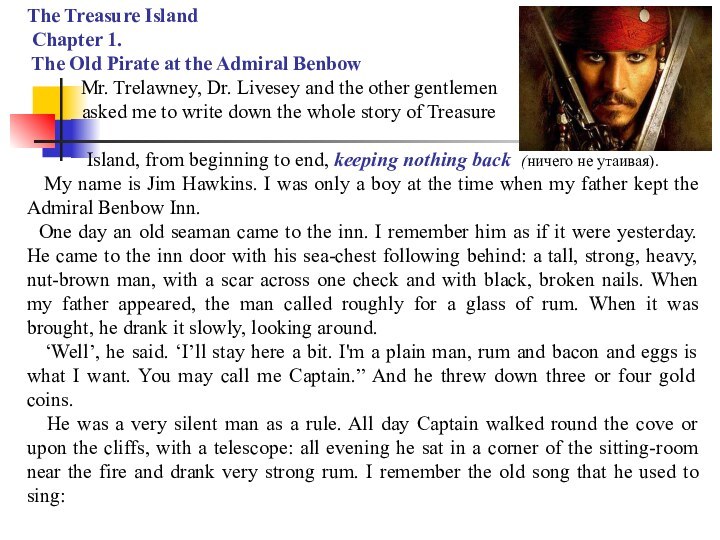
at the Admiral Benbow
Mr. Trelawney, Dr. Livesey and the other gentlemen
asked me to write down the whole story of Treasure
Island, from beginning to end, keeping nothing back (ничего не yтаивая).
My name is Jim Hawkins. I was only a boy at the time when my father kept the Admiral Benbow Inn.
One day an old seaman came to the inn. I remember him as if it were yesterday. He came to the inn door with his sea-chest following behind: a tall, strong, heavy, nut-brown man, with a scar across one check and with black, broken nails. When my father appeared, the man called roughly for a glass of rum. When it was brought, he drank it slowly, looking around.
‘Well’, he said. ‘I’ll stay here a bit. I'm a plain man, rum and bacon and eggs is what I want. You may call me Captain.” And he threw down three or four gold coins.
He was a very silent man as a rule. All day Captain walked round the cove or upon the cliffs, with a telescope: all evening he sat in a corner of the sitting-room near the fire and drank very strong rum. I remember the old song that he used to sing:
Слайд 28
Fifteen men on the dead man’s chest
–Yo

– ho – ho, and a bottle of rum!
Drink
and the devil had done for the rest.
–Yo – ho – ho, and a bottle of rum!
Every day when the captain came back from his walk, he used to ask if any seamen had gone along the road. At first we thought that he wanted company of his own kind, but then we began to realize that he wanted to avoid it. For me there was no mystery about it because one day he had taken me aside and promised me a silver coin on the first of every month if I would only ‘keep my eyes open for a seaman with one leg’ and let him know the moment he appeared.
Of course, I was very frightened by the thought of the seaman with one leg. I even dreamt about him every night. But I was less afraid of the captain than others. There were nights when he drank more rum than usually and then he sat and sang his wild songs, and made everyone listen to his stories. I often heard the house shaking with ‘Yo-ho-ho and a bottle of rum’, but it was his stories that frightened people most of all. Dreadful stories they were. He must have lived amongst some of the wickedest men upon the sea and the language in which he told them shocked our people almost as much as the crimes that he described.
Слайд 29
Captain never wrote and never received
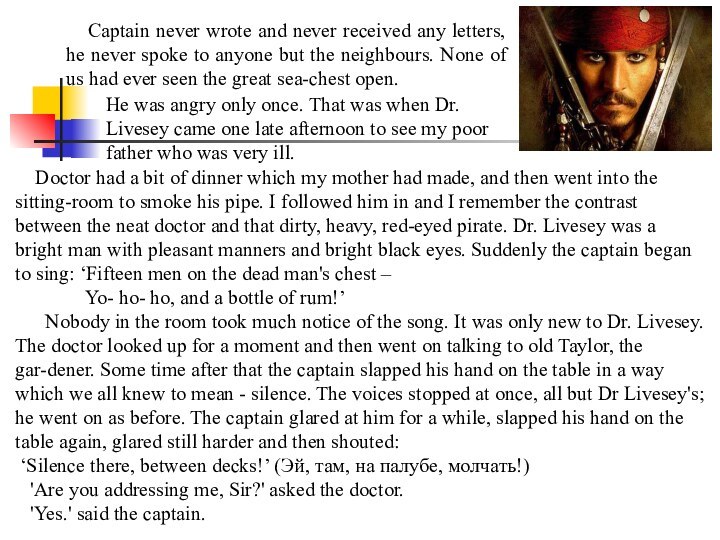
any letters, he never spoke to anyone but the
neighbours. None of us had ever seen the great sea-chest open.
Doctor had a bit of dinner which my mother had made, and then went into the sitting-room to smoke his pipe. I followed him in and I remember the contrast between the neat doctor and that dirty, heavy, red-eyed pirate. Dr. Livesey was a bright man with pleasant manners and bright black eyes. Suddenly the captain began to sing: ‘Fifteen men on the dead man's chest –
Yo- ho- ho, and a bottle of rum!’
Nobody in the room took much notice of the song. It was only new to Dr. Livesey. The doctor looked up for a moment and then went on talking to old Taylor, the gar-dener. Some time after that the captain slapped his hand on the table in a way which we all knew to mean - silence. The voices stopped at once, all but Dr Livesey's; he went on as before. The captain glared at him for a while, slapped his hand on the table again, glared still harder and then shouted:
‘Silence there, between decks!’ (Эй, там, на палубе, молчать!)
'Are you addressing me, Sir?' asked the doctor.
'Yes.' said the captain.
He was angry only once. That was when Dr. Livesey came one late afternoon to see my poor father who was very ill.
Слайд 30
Dr. Livesey didn't move. He spoke
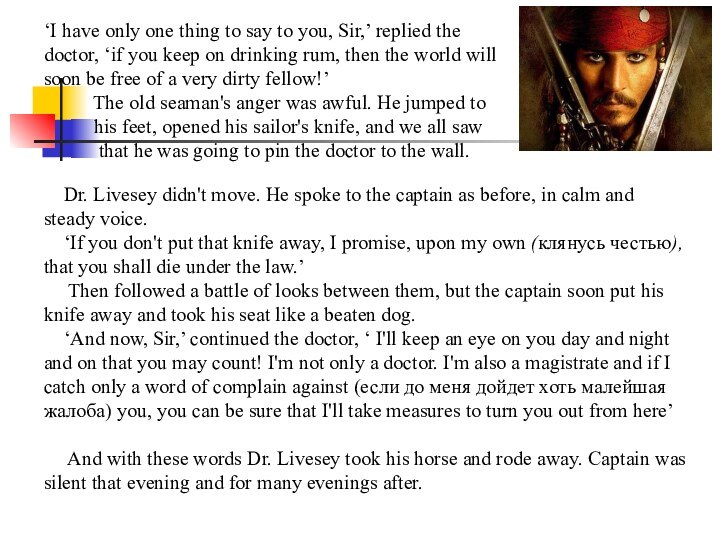
to the captain as before, in calm and steady
voice.
‘If you don't put that knife away, I promise, upon my own (клянусь честью), that you shall die under the law.’
Then followed a battle of looks between them, but the captain soon put his knife away and took his seat like a beaten dog.
‘And now, Sir,’ continued the doctor, ‘ I'll keep an eye on you day and night and on that you may count! I'm not only a doctor. I'm also a magistrate and if I catch only a word of complain against (если до меня дойдет хоть малейшая жалоба) you, you can be sure that I'll take measures to turn you out from here’
And with these words Dr. Livesey took his horse and rode away. Captain was silent that evening and for many evenings after.
‘I have only one thing to say to you, Sir,’ replied the doctor, ‘if you keep on drinking rum, then the world will soon be free of a very dirty fellow!’
The old seaman's anger was awful. He jumped to
his feet, opened his sailor's knife, and we all saw
that he was going to pin the doctor to the wall.
Слайд 31
Tasks
1. Answer the questions.
Who kept the Admiral Benbow
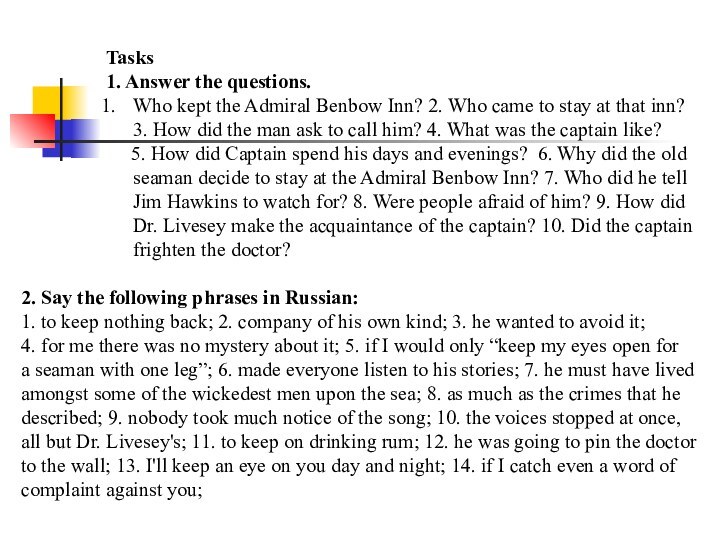
Inn? 2. Who came to stay at that inn?
3. How did the man ask to call him? 4. What was the captain like?
5. How did Captain spend his days and evenings? 6. Why did the old seaman decide to stay at the Admiral Benbow Inn? 7. Who did he tell Jim Hawkins to watch for? 8. Were people afraid of him? 9. How did Dr. Livesey make the acquaintance of the captain? 10. Did the captain frighten the doctor?
2. Say the following phrases in Russian:
1. to keep nothing back; 2. company of his own kind; 3. he wanted to avoid it;
4. for me there was no mystery about it; 5. if I would only “keep my eyes open for
a seaman with one leg”; 6. made everyone listen to his stories; 7. he must have lived amongst some of the wickedest men upon the sea; 8. as much as the crimes that he described; 9. nobody took much notice of the song; 10. the voices stopped at once,
all but Dr. Livesey's; 11. to keep on drinking rum; 12. he was going to pin the doctor to the wall; 13. I'll keep an eye on you day and night; 14. if I catch even a word of complaint against you;
Слайд 32
3. Find in the chapter the English for:
Cокровища;

с начала до конца; со шрамом на щеке; у
моего отца был постоялый двор; я помню его, словно это было вчера; он был молчаливым человеком; смотреть в оба; дать капитану знать; заставлять всех слушать
свои истории; самые отъявленные злодеи, какие только были на море;
не разговаривал ни с кем, кроме соседей; никто из нас никогда не видел, чтобы он открывал свой сундук; никто не обратил внимания на песню; Эй там, на палубе, молчать! клянусь вам честью; если до меня дойдет хоть малейшая жалоба на вас.
4. What are the missing words?
One day an old ... came to the inn door with his ... following behind. He had a... across one cheek. All day he walked round the ... or upon the ... with his telescope. He wanted a company of his own …. Nobody in the room ... of the song. It was only new to the … . We saw that the captain was going to ... Dr. Livesey to the wall.
5. Express the following in a different way. Use the words from the text.
store of gold, silver, jewels, coins / a man who attacks and robs ships at sea / a small hotel where travellers can stay / a sailor, a member of a ship's crew / to ask for something in an unpleasant manner / a strong drink / to watch for something closely / to keep away from / nobody paid attention to the song / the doctor continued to talk.
Слайд 33
Вставьте предлоги:
by upon at amongst about against between
on from with of for
1. I was only a
boy … the time when my father kept the Admiral Benbow Inn.
2. When my father appeared, the man called roughly … a glass of rum.
3. For me there was no mystery … it.
4. He promised me a silver coin … the first of every month.
5. I was very frightened … the thought of the seaman … one leg.
6. He must have lived … some of the wickedest men … the sea.
7. None … us had ever seen the great sea-chest open.
8. I remember the contrast … the neat doctor and that dirty, heavy, red-eyed pirate.
9. Dr. Livesey was a bright man … pleasant manners and bright black eyes.
10. ‘ I'll keep an eye … you day and night and on that you may count!’
11. ‘If I catch only a word of complain … you, I'll take measures to turn you out … here’
Слайд 34
In world literature R. L. Stevenson is
considered a brilliant master of description.
Description
is a technique authors use to help the readers picture something in the selection. There are two kinds of description:
a) technical description gives an objective account of the appearance or structure or a thing;
b) suggestive description evokes an impression of a place, scene, or person.
Suggestive description is primarily emotional. In describing a place or a scene the author first determines the central emotional effect which he wishes to evoke. Then the writer selects the details which will most effectively develop this impression and presents them as vividly as he can.
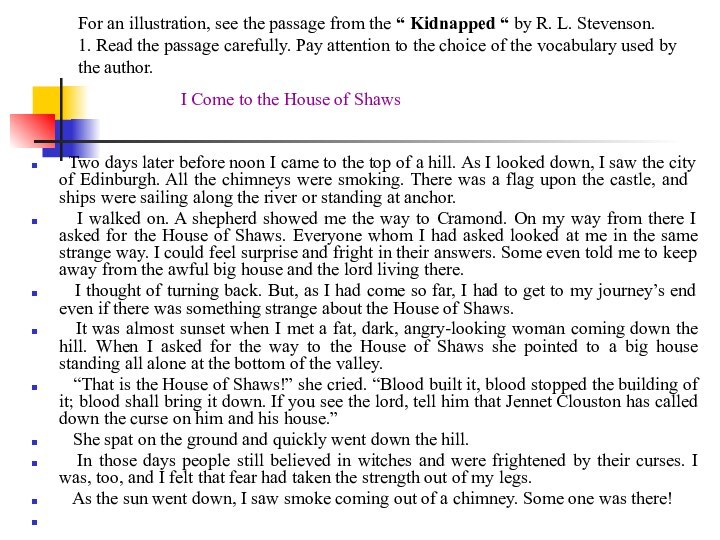
I Come to the House of Shaws
Two days later before noon I came to the top of a hill. As I looked down, I saw the city of Edinburgh. All the chimneys were smoking. There was a flag upon the castle, and ships were sailing along the river or standing at anchor.
I walked on. A shepherd showed me the way to Cramond. On my way from there I asked for the House of Shaws. Everyone whom I had asked looked at me in the same strange way. I could feel surprise and fright in their answers. Some even told me to keep away from the awful big house and the lord living there.
I thought of turning back. But, as I had come so far, I had to get to my journey’s end even if there was something strange about the House of Shaws.
It was almost sunset when I met a fat, dark, angry-looking woman coming down the hill. When I asked for the way to the House of Shaws she pointed to a big house standing all alone at the bottom of the valley.
“That is the House of Shaws!” she cried. “Blood built it, blood stopped the building of it; blood shall bring it down. If you see the lord, tell him that Jennet Clouston has called down the curse on him and his house.”
She spat on the ground and quickly went down the hill.
In those days people still believed in witches and were frightened by their curses. I was, too, and I felt that fear had taken the strength out of my legs.
As the sun went down, I saw smoke coming out of a chimney. Some one was there!
For an illustration, see the passage from the “ Kidnapped “ by R. L. Stevenson.
1. Read the passage carefully. Pay attention to the choice of the vocabulary used by the author.
Слайд 36
I sat down and looked at the House
of Shaws. The countryside was very pleasant. There were
sheep grazing in the fields. The climate and the earth seemed to be good. But the lonely house was not what I had imagined.
I stood up and walked towards the house along a little path which could hardly be seen in the grass.
The nearer I came to the house the more dreary it looked. One end of it had not been finished and there was no roof on it. Most of the windows had no glass. Bats flew in and out.
It was almost night as I came near the big, heavy door. In three of the low windows a little light glimmered.
Tasks:
1. Find in the text the description of Edinburgh.
Can
you picture the place?
What impression does it make on you? (gloomy, sad, optimistic, lively, cheerful, melancholic, etc.) Compare it with the description of the countryside.
2. Find in the text the description of the House of Shaws.
a) Does Stevenson make us feel David’s disappointment at the first sight of the house?
b) How does he do it? Find in the text some sentences to prove your opinion.
c) What impression of the house does the author want to give us? (Use the words: dreary, lonely, deserted, half-ruined, gloomy, etc.)
d) Examine the means the author uses to create the certain effect. How does he evoke this or that impression? (by the things he mentions; by the words he uses.)
3. Give a list of things the author mentions to create the certain effect.
4. Give a list of words the author uses to achieve the desirable effect.
5. Try to summarize what description is and by what means the author can get the certain effect.
Слайд 38
OSCAR WILDE
(1854 – 1900)
UNIT 3
Oscar Wilde was born
in Dublin,
Ireland, in 1854. His father was
a famous Irish doctor; his mother was a well-known poetess.
Oscar’s main interests in school were poetry and classics. Later, at Oxford, Wilde showed a gift for art and humani-ties. The young man received a number of classical prizes and graduated with first-class honours. While at Oxford, Wilde became a leader of the aesthetic movement in England. He was one of the most prominent personalities of the day; he wore his hair long, decorated his rooms with peacock’s feathers, lilies, sunflowers, blue china and other wonderful things.
Oscar Fingal
O’Flaherty Wills Wilde
Слайд 39
His witty paradoxes and sayings were
quoted everywhere.
After graduating from Oxford
he turn-
ed to writing, travelling and lecturing.
In 1882, Wilde went to the USA.
His lectures were greatly successful. During the following ten years he wrote most of his famous works. Among them were ‘The Happy Prince’ and Other Tales’ (1888), ‘The Picture of Dorian Gray’ (1891), his comedies ‘Lady Windermere’s Fan’ (1892), ‘An Ideal Husband’ (1895) and others. The wit and brilliance of these plays help keep them on the stage.
O. Wilde also wrote poems, essays, letters and articles on different subjects - history, drama, painting, etc.
He died in Paris, in 1900.
Oscar Wilde January, 1882
Слайд 40
SYMPHONY IN YELLOW
An omnibus across the bridge
Crawls like a yellow butterfly
And here and there a passer-by
Shows like a little restless midge.
Big barges full of yellow hay
Are moved against the shadowy wharf,
And like a yellow silken scarf
The thick fog hangs along the quay.
The yellow leaves begin to fade
And flutter from the Temple elms,
And at my feet the pale green Thames
Lies like a rod of rippled jade.
СИМФОНИЯ В ЖЕЛТОМ
Ползет, как желтый мотылек,
Высокий омнибус с моста,
Кругом прохожих суета -
Как мошки вьются вдоль дорог.
Покинув сумрачный причал,
Баржа уносит желтый стог,
Как шелка желтого поток,
Туман дома запеленал.
И с желтых вязов листьев рой
У Темпла пасмурно шуршит,
Мерцает Темза, как нефрит,
Зеленоватой желтизной.
Перевод И.Д. Копостинской
Tower Bridge, London
Слайд 42
O’Henry, whose real name was William
Sydney
Porter, was an American short-story writer. His stories are still popular today.
He was born in 1862 in a small provincial town. In his early years he tried a lot of jobs, among which were several literary ones. O’Henry’s first story was published in 1899, when the writer was in prison on a false charge of stealing money from a bank. After he came out of prison, he became a professional writer.
O’Henry describes the life of the “little people”: clerks, shop assistants and farm workers. His stories are mainly humorous and amusing, with the traditional happy end. Through the gaiety and humour of his stories, however, the hard life of the poor can be seen.
O’HENRY
(1862 – 1910)
UNIT 4
Слайд 43
UNIT 4
Two young painters, Sue and
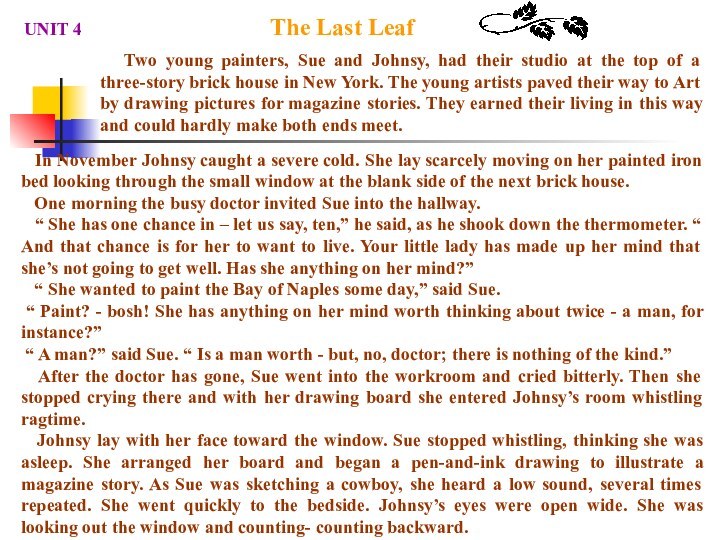
Johnsy, had their studio at the top of a
three-story brick house in New York. The young artists paved their way to Art by drawing pictures for magazine stories. They earned their living in this way and could hardly make both ends meet.
The Last Leaf
In November Johnsy caught a severe cold. She lay scarcely moving on her painted iron bed looking through the small window at the blank side of the next brick house.
One morning the busy doctor invited Sue into the hallway.
“ She has one chance in – let us say, ten,” he said, as he shook down the thermometer. “ And that chance is for her to want to live. Your little lady has made up her mind that she’s not going to get well. Has she anything on her mind?”
“ She wanted to paint the Bay of Naples some day,” said Sue.
“ Paint? - bosh! She has anything on her mind worth thinking about twice - a man, for instance?”
“ A man?” said Sue. “ Is a man worth - but, no, doctor; there is nothing of the kind.”
After the doctor has gone, Sue went into the workroom and cried bitterly. Then she stopped crying there and with her drawing board she entered Johnsy’s room whistling ragtime.
Johnsy lay with her face toward the window. Sue stopped whistling, thinking she was asleep. She arranged her board and began a pen-and-ink drawing to illustrate a magazine story. As Sue was sketching a cowboy, she heard a low sound, several times repeated. She went quickly to the bedside. Johnsy’s eyes were open wide. She was looking out the window and counting- counting backward.
Слайд 44
UNIT 4
“ Twelve,” she said, and a little
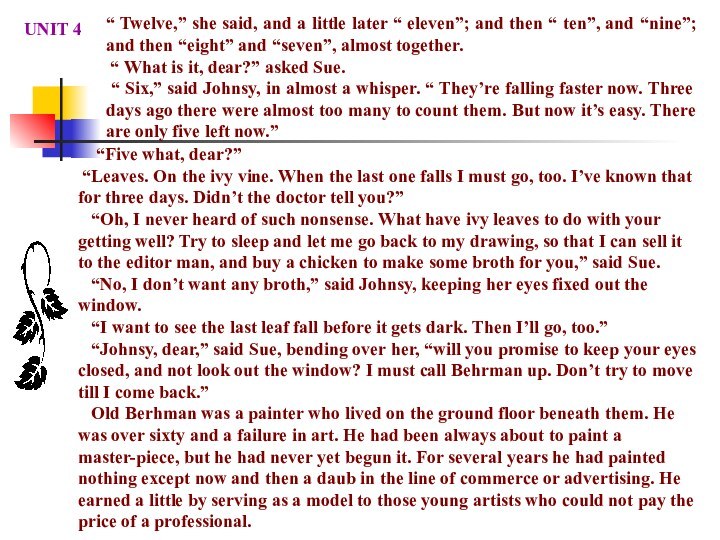
later “ eleven”; and then “ ten”, and “nine”;
and then “eight” and “seven”, almost together.
“ What is it, dear?” asked Sue.
“ Six,” said Johnsy, in almost a whisper. “ They’re falling faster now. Three days ago there were almost too many to count them. But now it’s easy. There are only five left now.”
“Five what, dear?”
“Leaves. On the ivy vine. When the last one falls I must go, too. I’ve known that for three days. Didn’t the doctor tell you?”
“Oh, I never heard of such nonsense. What have ivy leaves to do with your getting well? Try to sleep and let me go back to my drawing, so that I can sell it to the editor man, and buy a chicken to make some broth for you,” said Sue.
“No, I don’t want any broth,” said Johnsy, keeping her eyes fixed out the window.
“I want to see the last leaf fall before it gets dark. Then I’ll go, too.”
“Johnsy, dear,” said Sue, bending over her, “will you promise to keep your eyes closed, and not look out the window? I must call Behrman up. Don’t try to move till I come back.”
Old Berhman was a painter who lived on the ground floor beneath them. He was over sixty and a failure in art. He had been always about to paint a master-piece, but he had never yet begun it. For several years he had painted nothing except now and then a daub in the line of commerce or advertising. He earned a little by serving as a model to those young artists who could not pay the price of a professional.
Слайд 45
UNIT 4
When Sue awoke from an
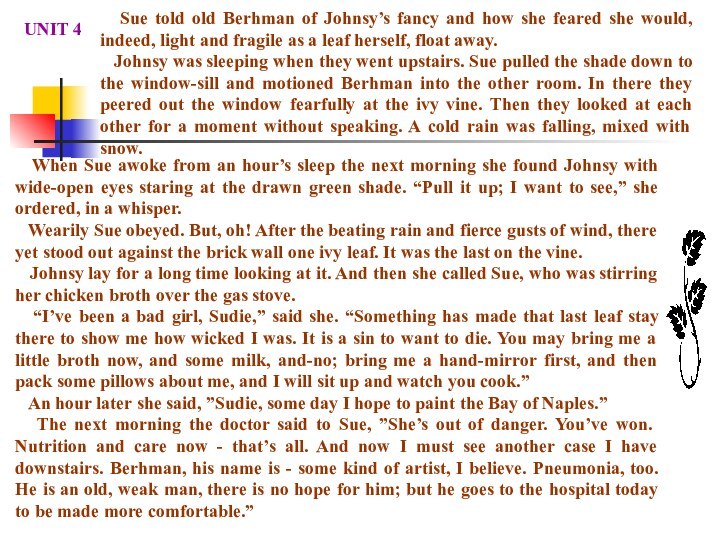
hour’s sleep the next morning she found Johnsy with
wide-open eyes staring at the drawn green shade. “Pull it up; I want to see,” she ordered, in a whisper.
Wearily Sue obeyed. But, oh! After the beating rain and fierce gusts of wind, there yet stood out against the brick wall one ivy leaf. It was the last on the vine.
Johnsy lay for a long time looking at it. And then she called Sue, who was stirring her chicken broth over the gas stove.
“I’ve been a bad girl, Sudie,” said she. “Something has made that last leaf stay there to show me how wicked I was. It is a sin to want to die. You may bring me a little broth now, and some milk, and-no; bring me a hand-mirror first, and then pack some pillows about me, and I will sit up and watch you cook.”
An hour later she said, ”Sudie, some day I hope to paint the Bay of Naples.”
The next morning the doctor said to Sue, ”She’s out of danger. You’ve won. Nutrition and care now - that’s all. And now I must see another case I have downstairs. Berhman, his name is - some kind of artist, I believe. Pneumonia, too. He is an old, weak man, there is no hope for him; but he goes to the hospital today to be made more comfortable.”
Sue told old Berhman of Johnsy’s fancy and how she feared she would, indeed, light and fragile as a leaf herself, float away.
Johnsy was sleeping when they went upstairs. Sue pulled the shade down to the window-sill and motioned Berhman into the other room. In there they peered out the window fearfully at the ivy vine. Then they looked at each other for a moment without speaking. A cold rain was falling, mixed with snow.
Слайд 46
UNIT 4
And that afternoon Sue came
to the bed where Johnsy lay. “I have something
to tell you, white mouse,” said she. “Mr. Berhman died of pneumonia today in the hospital. He was ill only two days. They found him on the morning of the first day in his room downstairs helpless with pain. His shoes and clothing were wet through and icy cold. They couldn’t imagine where he had been on such a dreadful night. And then they found a lantern, still lighted, and the ladder that had been dragged from its place, and some brushes, and the palette with green and yellow colors mixed on it, and –look out the window, dear, at the last ivy leaf on the wall. Didn’t you wonder why it never moved when the wind blew? Ah, darling, it’s Berhman’s masterpiece – he painted it there the night that the last leaf fell.”
Слайд 47
TASKS
1. What do you know about the main
characters of the story?
a) They were two friends working
as models to professional artists.
b) They were young students who earned their living by painting a daub in the line of commerce or advertising.
c) They studied painting in the New York Academy of Arts.
d) They were two young painters who got money for drawing pictures for New York magazine stories.
2.What could save Johnsy, according to the doctor?
a) some expensive medicine.
b) her wish to paint the Bay of Naples.
c) Her desire to live.
d) Nutrition and care of her friend.
3. What fixed idea did Johnsy have about her fate?
She would die if she didn’t paint the Bay of Naples.
She would stay in bed forever.
She would get well when autumn was over.
She would go away when the last ivy leaf fell.
Слайд 48
4. What is said about Behrman?
a) He
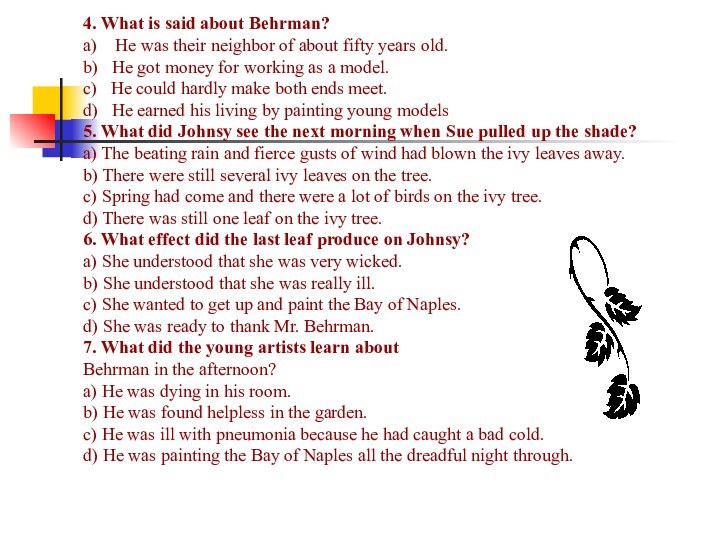
was their neighbor of about fifty years old.
b)
He got money for working as a model.
c) He could hardly make both ends meet.
d) He earned his living by painting young models
5. What did Johnsy see the next morning when Sue pulled up the shade?
a) The beating rain and fierce gusts of wind had blown the ivy leaves away.
b) There were still several ivy leaves on the tree.
c) Spring had come and there were a lot of birds on the ivy tree.
d) There was still one leaf on the ivy tree.
6. What effect did the last leaf produce on Johnsy?
a) She understood that she was very wicked.
b) She understood that she was really ill.
c) She wanted to get up and paint the Bay of Naples.
d) She was ready to thank Mr. Behrman.
7. What did the young artists learn about
Behrman in the afternoon?
a) He was dying in his room.
b) He was found helpless in the garden.
c) He was ill with pneumonia because he had caught a bad cold.
d) He was painting the Bay of Naples all the dreadful night through.
Слайд 49
8. Why do you think old Behrman fell
ill with pneumonia?
a) Because he had to earn his
living by painting at night.
b) Because he had promised Sue to get money for expensive medicine.
c) Because he decided to help the young painters.
d) Because he couldn’t fall asleep that rainy night and went for a walk.
9. Why did Sue call the last leaf painted by Behrman his masterpiece?
a) It was his first picture.
b) It was the best picture he ever painted.
c) It helped Johnsy understand she was not right.
d) It saved the life of a young girl.
10. Find the equivalents in the text for the following:
мокрый насквозь / порывы ветра / с широко открытыми глазами / шепотом / трехэтажный кирпичный дом / заработать немного денег / нарисовать шедевр / быть вне опасности / оплатить работу профессионала / неудачник в искусстве / глухая стена соседнего дома / насвистывать джазовую мелодию / посмотреть друг на друга.
11. Give a short summary of the story.
Слайд 50
In the evening Valentine arrived

in his native town, went directly to the cafe
of his old friend Mike and shook hands with him. Then he took the key of his room and went upstairs. Everything was just as he had left it. Jimmy removed the panel in the wall and dragged out a dust-covered suitcase. He opened it and looked fondly at the finest set of burglar’s tools. It was a complete set made of special steel. The set consisted of various tools of the latest design. Over nine hundred dollars they had cost him.
A week after the release of Valentine there was a new safe-burglary in Richmond. Two weeks after that another safe was opened. That began to interest the detectives. Ben Price, a famous detective, got interested in these cases. “That’s Jimmy Valentine’s work. He has resumed business. He has got the only tools that can open any safe without leaving the slightest trace.”
Jimmy Valentine’s Reformation
(after O’Henry)
Jimmy Valentine was released that day.
“Now, Valentine,” said the warden, ”you’ll go out today. Make a man of yourself.
You are not a bad fellow, really. Stop breaking safes and be honest.”
“Me?” said Jimmy in surprise. “Why, I’ve never broken a safe in my life.” The warden laughed. “Better think over my advice, Valentine.”

Jimmy Valentine came to Elmore, a little town in
Arkansas. A young lady crossed the street, passed him at the corner and entered the door over which was the sign “The Elmore Bank”. Jimmy Valentine looked into her eyes, forgot what he was and became another man. Jimmy called a boy who was standing on the steps of the bank and began to ask him questions about the town and the people of the town. From this boy he learnt that this girl was Annabel Adams and that her father was the owner of the bank.
Jimmy went to a hotel and registered as Ralf Spencer. To the clerk he said that he had come to Elmore to start business. The clerk was impressed by the clothes and manners of Jimmy and he was ready to give Jimmy any information. Soon Jimmy opened a shoe-store and made large profits. He was popular with many important people and had many friends. And he accomplished the wish of his heart. He met Miss Annabel Adams and she fell in love with him too.
Annabel’s father, who was a typical country banker approved of Spencer. The young people were to be married in two weeks. Jimmy gave up safe-burglary forever. He was an honest man now. He decided to get rid of his tools.
At that moment a new safe was put in Mr. Adams’ bank. The old man was very proud of it and insisted that everyone should inspect it. So one day the whole family with children went to the bank. Mr. Adams enthusiastically explained the workings of the safe to Spencer.

The two children were delighted
to see the shining metal and the funny clock. While
they were thus engaged Ben Price, the detective, walked into the bank and stood at the counter watching the scene. He told the cashier that he was just waiting for the man he knew. Suddenly there was a loud scream from the woman.
Unseen by the elders, May, the smallest girl had shut herself in the vault.
“It’s impossible to open the door now,” said Mr Adams in a trembling voice, “because the clock of the safe hasn’t been wound. Oh, what shall we do? That child - she can’t stand it for long because there isn’t enough air in there.”
“Get away from the door, all of you,” suddenly commanded Spencer. And it must be mentioned that Jimmy happened to have his suitcase with him because he was going to get rid of it that day. Very calmly he took out the tools and in ten minutes the vault was opened. The others watched him in amazement. The little girl, crying, rushed to her mother.
Jimmy took his suitcase and came up to Ben Price whom he had noticed before.
“Hello, Ben”, he said, “Let’s go. I don’t think it matters much now.” And suddenly Ben Price acted rather strangely.
“I guess, you are mistaken, Mr Spencer,” he said. “I don’t seem to recognize you. I think your fiancee is waiting for you, isn’t she?”
And Ben Price turned and walked out of the bank.
Tasks:
1.Why did the warden laugh?
He liked Jimmy a lot. B) He wanted to cheer Jimmy up.
C) He didn’t believe Jimmy. D) He was happy that Jimmy was leaving.
2. What did Jimmy want to see after the prison most of all?
A) His native town. B) His friend’s cafe.
C) His room. D) His instruments.
3. What does “that” in line 13 refer to?
Valentine’s release. B) Detective Ben Price.
C) The set of burglar’s tools. D) The causes of safe-burglary.
4. Why did Jimmy ask the boy questions? He wanted to …
prepare the bank robbery. B) learn more about Elmore.
C) learn who the girl was. D) know everything about the bank owner.
5.What did the people like hotel clerk think about Jimmy? –They thought he …
A) was rich. B) was suspicious. C) was a detective. D) knew important people.
6. Did Mr. Adams like the idea of Jimmy marrying his daughter?
A) He did. B) He didn’t. C) He didn’t care. D) He was in doubts.
Слайд 54
What happened when people were inspecting thе safe?
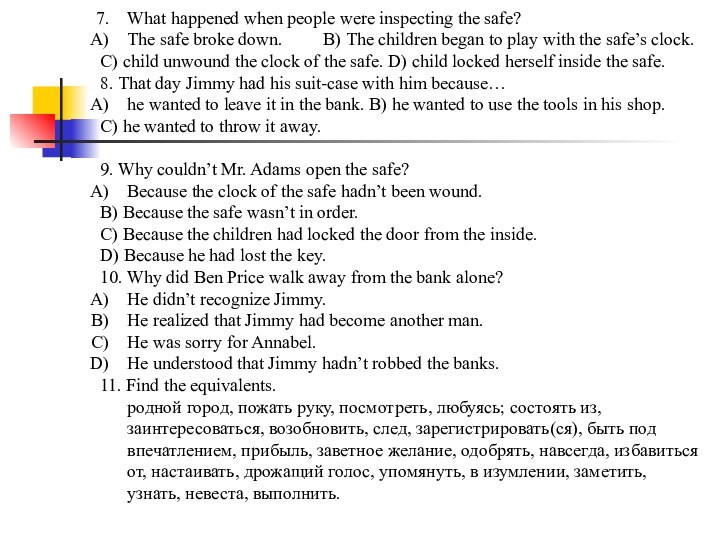
The safe broke down. B)
The children began to play with the safe’s clock.
C) child unwound the clock of the safe. D) child locked herself inside the safe.
8. That day Jimmy had his suit-case with him because…
he wanted to leave it in the bank. B) he wanted to use the tools in his shop.
C) he wanted to throw it away.
9. Why couldn’t Mr. Adams open the safe?
Because the clock of the safe hadn’t been wound.
B) Because the safe wasn’t in order.
C) Because the children had locked the door from the inside.
D) Because he had lost the key.
10. Why did Ben Price walk away from the bank alone?
He didn’t recognize Jimmy.
He realized that Jimmy had become another man.
He was sorry for Annabel.
He understood that Jimmy hadn’t robbed the banks.
11. Find the equivalents.
родной город, пожать руку, посмотреть, любуясь; состоять из, заинтересоваться, возобновить, след, зарегистрировать(ся), быть под впечатлением, прибыль, заветное желание, одобрять, навсегда, избавиться от, настаивать, дрожащий голос, упомянуть, в изумлении, заметить, узнать, невеста, выполнить.
Слайд 55
Jimmy Valentine’s Reformation
(after O’Henry)
I. Translate into Russian.
Make a man of yourself.
native town
a dust-covered suitcase
a complete set
special steel
various tools
of the latest design
a new safe-burglary
a famous detective
without leaving the slightest trace
large profits
the wish of his heart
an honest man
the shining metal
the funny clock
a trembling voice
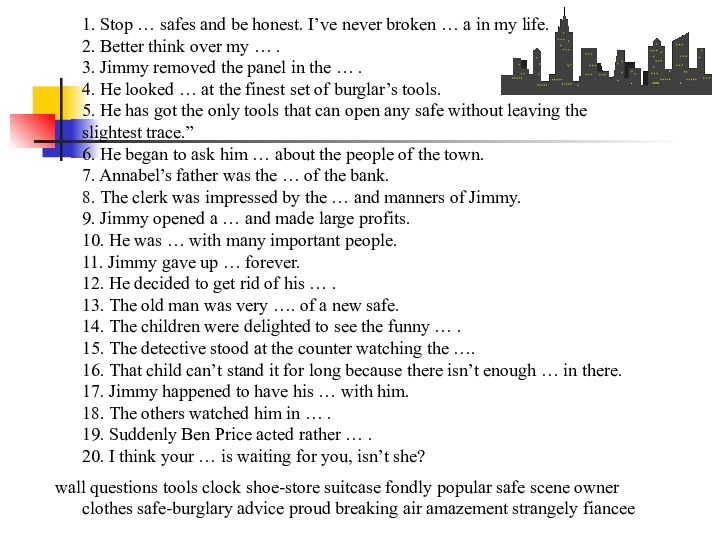
safes and be honest. I’ve never broken … a
in my life. 2. Better think over my … . 3. Jimmy removed the panel in the … . 4. He looked … at the finest set of burglar’s tools. 5. He has got the only tools that can open any safe without leaving the slightest trace.” 6. He began to ask him … about the people of the town. 7. Annabel’s father was the … of the bank. 8. The clerk was impressed by the … and manners of Jimmy. 9. Jimmy opened a … and made large profits. 10. He was … with many important people. 11. Jimmy gave up … forever. 12. He decided to get rid of his … . 13. The old man was very …. of a new safe. 14. The children were delighted to see the funny … . 15. The detective stood at the counter watching the …. 16. That child can’t stand it for long because there isn’t enough … in there. 17. Jimmy happened to have his … with him. 18. The others watched him in … . 19. Suddenly Ben Price acted rather … . 20. I think your … is waiting for you, isn’t she?
wall questions tools clock shoe-store suitcase fondly popular safe scene owner clothes safe-burglary advice proud breaking air amazement strangely fiancee
WILLIAM SOMERSET MAUGHAM
(1874 – 1965)
William Somerset Maugham is one of the best-known English writers of the present day. He was not only an outstanding novelist but also one of the most successful dramatists and short-story writers.
His father was an official at the British Embassy in France and William spent his childhood in that country. In his later life he also lived for long periods there.
In his youth Maugham wanted to become a doctor, so he graduated from a medical college and worked at a hospital in Lambeth – one of the poorest districts of London. But in 1897, when he was only 23, Maugham wrote and published his first novel “Lisa of Lambeth” and after that he went on producing books, one almost every year for more than sixty years.
In his literary works Maugham gave a realistic picture of the English bourgeois society – its egoism and false democracy, but he did not want to improve that society or human nature. He expected little or nothing of the people surrounding him.
Слайд 58
Дерево, под которым любил работать писатель
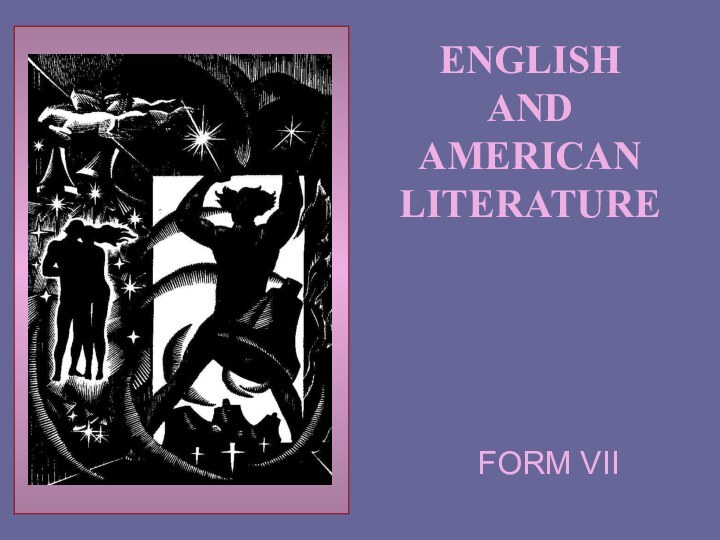
![Презентация к спецкурсу Англоязычная литература /7 класс/ Unit 1 - Limericks LIMERICKS limerick ['lim(e)rik] n- лимерик (шуточное стихотворение из пяти строк, где две](/img/tmb/6/520512/f3d9e24dce1445f4ea03daf46101d374-720x.jpg)

